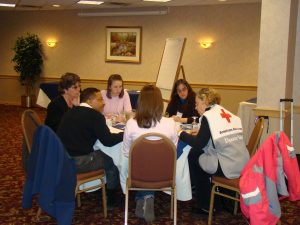What is the role of a volunteer?
Disaster Behavioral Health Volunteers may provide support in shelters and places where victims and responders convene. They can provide psychological first aid, crisis counseling, stress reduction, outreach, psychosocial education, and referral if necessary. Volunteers can also provide support to emergency workers who are under high levels of stress. The focus is support for resilience and healing for individuals, families and communities. Deployed teams work under the supervision of a trained Team Leader. 
Who can become a volunteer?
- Mental Health Counselors
- Substance Abuse Counselors
- Spiritual Leaders
- Natural Community Helpers
- Others with experience in behavioral health.
- Professional credentials are not required.
Join Our Team
How to become a trained Maine Disaster Behavioral Health Response Team (DBHRT) Volunteer
1. Complete the state’s one-day Disaster Behavioral Health Response Team (DBHRT) Volunteer training. To receive information on the next training, please fill out the training request form. Training is required.
2. Complete the following online course. Incident Command System, (ICS) training (IS 100). Online course required.
3. Download & review a copy of the Maine Disaster Behavioral Health Response Team (DBHRT) Application.
4. Submit a completed a Maine DBHRT application. Upon receipt a background check will be completed.
5. Register to become part of the Maine Responds Emergency Health Volunteer System. Registering as a Maine Responds volunteer will help ensure that people affected by a disaster will receive the public health and medical care they need.
